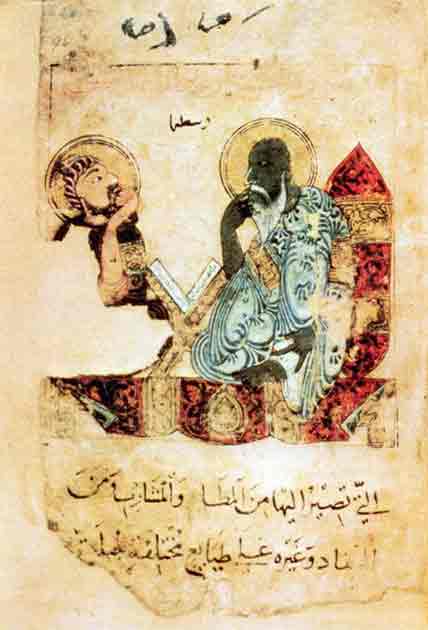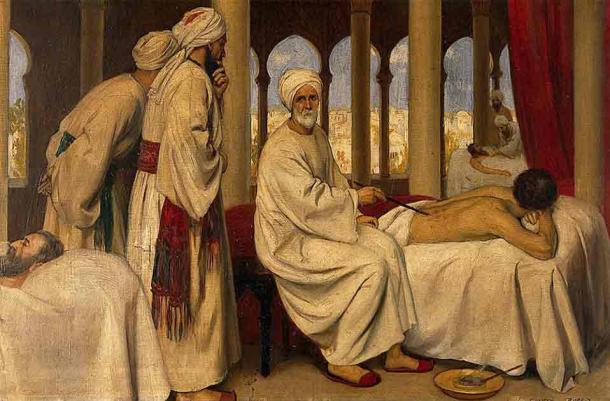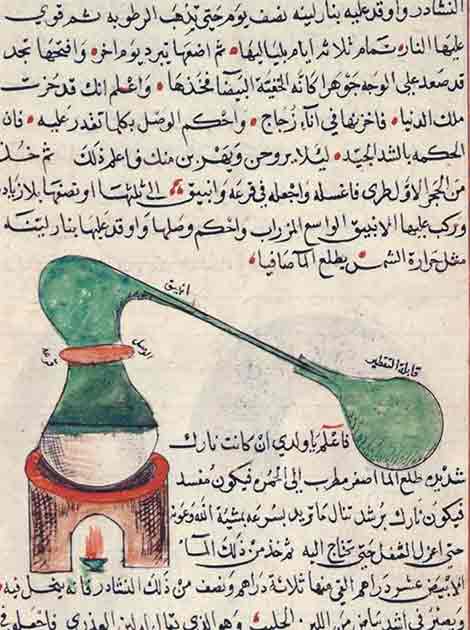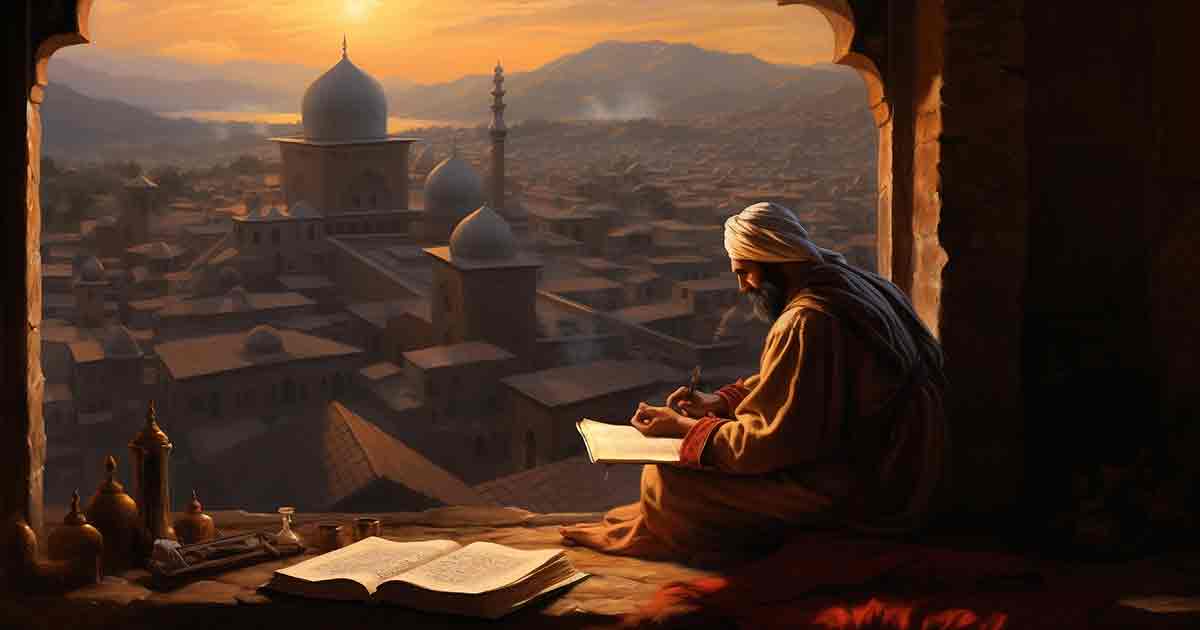“Historical Amnesia” Obscures Forgotten Achievements of Muslim Culture
In an article authored by Craig Considine and published in The Huffington Post, the veil is lifted on a profound historic oversight in some educational curriculums: the neglect of Muslim achievements in the history of education, philosophy, healthcare, and science. This so-called “historical amnesia” underscores a critical need to reexamine and celebrate the invaluable contributions of Muslim culture to these pivotal domains.

The courtyard of the mosque at Al-Qarawiyyin University in Morocco, one of the primary educational centers of the Islamic Golden Age. (Abdel Hassouni / CC BY-SA 4.0)
Historic Muslim Achievements and Contributions to Education
It may come as a surprise to some that the first university in the world was established by two Muslim women, Fatima and Miriam al-Firhi, who set up Al-Qarawiyyin in Fez, Morocco, in 859 AD. Students were schooled here in a plethora of secular and religious subjects, and at the end of their education, teachers evaluated students and awarded degrees based on good performance. The concept of awarding degrees later spread to Andalusia, Spain, and later to the Universities of Bologna in Italy and Oxford in England, among others.
- The Oldest University in the World May Not Be Where You Think And the Founder May Also Surprise You
- The Uncharted Horizons of Ibn Hawqal, the World’s First Travel Writer
During the 8th to 15th centuries, Spanish Muslims in Andalusia championed education, making the region a global hub for knowledge and learning. It was here that students from diverse backgrounds studied science under Muslim educators in an environment that prioritized tolerance and inclusivity.

Islamic illustration of Aristotle teaching a student. (Public domain)
Historic Muslim Achievements and Contributions to Philosophy
During the 8th century, while Europe languished in the absence of much of ancient Greece's wisdom, Muslim scholars undertook the translation of these profound philosophical texts from Latin into Arabic. Considine described this as “one of the greatest transmissions of knowledge in world history.” The credit for bringing the ideas of the great Greek writers such as Socrates, Aristotle and Plato into Europe therefore rests with these Muslim scholars, who resurrected Greek philosophy and “gave new life into a European continent that was bogged down with religious dogma and bloody internal conflicts.”
Al-Ghazali, a Sufi Muslim hailing from Persia in the 11th and 12th centuries, left an indelible mark on early Islamic philosophy by spearheading the development of Neoplatonism. Amidst perceived conflicts between ancient Greek ideas and Islamic teachings, he skillfully integrated Aristotelian logic and Neoplatonic methods to temper excessive Islamic rationalism.
Meanwhile, Ibn Khaldun, a towering figure born in 1332 in Tunis, Tunisia, reshaped historical inquiry. Renowned as one of the world’s greatest historians, he authored the Muqaddimah (meaning “Introduction”), a seminal work that laid the groundwork for modern governance and social sciences. In this groundbreaking text, Ibn Khaldun explored themes of historiography, sociology, economics, and politics, offering insights into the rise and fall of civilizations and delineating the role of rulers for the collective good. His pioneering contributions continue to influence scholars and policymakers to this day.

Al-Zahrawi, seen here blistering a patient in a Cordoba hospital, has been remembered for his significant contributions to the field of surgery during the Islamic Golden Age. (Wellcome Images / CC BY 4.0)
Historic Muslim Achievements and Contributions to Health Care
In 872, amidst the bustling streets of Cairo, Egypt, the Ahmad ibn Tulun hospital was founded and came to offer a revolutionary approach to healthcare. This pioneering institution not only provided medical treatment but also served as a rehabilitation center for recovery and a retirement facility for the elderly lacking familial support.
Tulun, like other Islamic hospitals that emerged shortly after, operated as a secular institution. It believed in its moral duty to provide care for individuals regardless of gender, age, wealth, or religious affiliation. Remarkably, it was the first hospital to extend care to the mentally ill, marking a significant milestone in the history of healthcare and compassion.
In 10th century Al-Andalus, the Islamic Iberian Peninsula (modern-day Spain and Portugal), the surgeon Al-Zahrawi (also known as Abucasis) penned an illustrated encyclopedia. This seminal work served as a cornerstone for European surgeons over the ensuing five centuries. Besides being remembered as the pioneer of the caesarean, Al-Zahrawi's pioneering surgical instruments, including scalpels and forceps, remain integral to modern surgical techniques.

Drawing of an alembic, a type of distillation apparatus used to separate liquids, by Jabir Ibn Hayyan who has been remembered as the founder of modern chemistry. (Public domain)
Historic Muslim Achievements and Contributions to Science
During the Islamic Golden Age, spanning from the 7th to the 16th centuries, Muslims made remarkable contributions to science that shaped the course of human knowledge. Among the many significant Muslim achievements, scientists pioneered advancements in chemistry, astronomy and physics.
In the realm of chemistry, Muslim scientists played a pivotal role in transforming alchemy into modern chemistry during the 8th and 9th centuries. Notably, Jabir Ibn Hayyan, known as the founder of modern chemistry, made groundbreaking discoveries in Andalusia. His pioneering work in distillation, crystallization, evaporation and filtration laid the foundation for modern chemical processes. Ibn Hayyan's contributions, including the discovery of sulphuric and nitric acid, were deemed as crucial as those of renowned European chemists.
- Muhammad ibn Zakariya al-Razi: Islam's Medical Genius
- Ismail al-Jazari: Medieval Muslim Inventor and "Father of Robotics"
“There is also little doubt that the development of astronomy owes a great deal to the work of Muslim astronomers,” stressed Considine in The Huffington Post. Muslim astronomers established astronomical observatories across the Islamic world. As early as the 9th century, Caliph Al-Ma'mum founded observatories in Baghdad and Damascus. Five hundred years later, Prince Ulugh Bey constructed a monumental observatory in Samarqand, followed by Sultan Murad III's observatory in Istanbul in 1577. Additionally, Ottoman astronomer Taqi al-Din developed innovative astronomical tables and instruments, revolutionizing celestial measurements.
Furthermore, Muslims made groundbreaking strides in aviation, exemplified by Ibn Firnas, an engineer from Andalusia in the 9th century. Ibn Firnas constructed a flying machine and attempted flight by jumping from the Grand Mosque's minaret in Cordoba, Spain. While his attempt did not achieve sustained flight, he pioneered parachute design, marking a significant milestone in aviation history.
In medieval Islam, the sciences were viewed holistically. The individual scientific disciplines were approached in terms of their relationships to each other and the whole, as if they were branches of a tree. The most important scientists were skilled in the practice of medicine as well as astronomy and mathematics. These multi-talented sages, the central figures in Islamic science, elaborated and personified the unity of the sciences. They orchestrated scientific development through their insights and excelled in their explorations as well.

Representational image of Muslim scholar. (shelbys / Adobe Stock)
Countering Historical Amnesia: Celebrating Muslim Achievements in a Global Context
Muslim achievements often go unrecognized in Western culture due to historical biases, stereotypes and geopolitical tensions. Eurocentric views prioritize Western contributions, while negative portrayals of Islam perpetuate misconceptions. Geopolitical conflicts exacerbate the divide.
Addressing this challenge necessitates the proactive dismantling of biases, facilitating cultural exchange, and enhancing comprehension of Muslim contributions through educational initiatives and accurate media portrayal. As Consodine advocates, global education about these achievements is essential to dispel misconceptions and prevent significant aspects of world history from being overlooked or disregarded due to “historical amnesia.”
Top image: Representational image of Muslim achievements to science, medicine, philosophy and education. Source: mknisanci / Adobe Stock
References
Al-Hassani, S. T. S. 2012. 1001 Inventions: The Enduring Legacy of Muslim Civilization. National Geographic: Washington D. C.
Al-Khalili, J. 2010. Pathfinders: The Golden Age of Arabic Science. Allen Lane: London
Baby Professor. 2020. Muslim Contributions: A Thousand and One Arabian Gifts. Baby Professor.
Considine, C. 22 October 2013. “Overcoming Historical Amnesia: Muslim Contributions to Civilization” in The Huffington Post. Available at: https://www.huffpost.com/entry/overcoming-historical-amnesia_b_4135868
Livingston, J. W. 2018. The Rise of Science in Islam and the West: From Shared Heritage to Parting of the Ways, 8th to 18th Centuries. Routledge: London.

















Comments
"During the 8th century, while Europe languished in the absence of much of ancient Greece's wisdom..."
Ancient Greek wisdom is overstated deliberately because it was Pagan. 8th century Europe is understated deliberately because it was increasingly Christian.
Muslims have made enormous contributions to civilization. According to Consodine, people around the world should be taught about these contributions to dispel misperceptions so major trends or events in world history are no longer forgotten or blatantly ignored in a case of “historical amnesia.”
Greek was the language used by the Byzantine Empire. Greece was part of the Byzantine Empire until taken by the Moslems.
The Moslems did not destroy the Byzantine Empire until 1453 and before that happened, the Byzantines sent much of their culture out of Constantinople.
These glittering generalities presented above do not indicate any cultural achievements.
Sadly, Islamic culture is now know for its astounding levels of violence towards their fellow man. If Albert Einstein was machine gunning restaurant patrons and concert goers aand flying planes into buildings we'd probably quickly forget all the brilliant ideas he came up with as well.
A bit of a selective presentation, since it doesn't mention that Muslim superstitions censored out all illustrations representing living things, so it made no sense to preserve the text of a Greek biology text if you couldn't illustrate the flora and fauna, which the Greeks drew well and with perspective, leaving people to guess at the meaning. Only abstract diagrams such as in geometry were preserved.
It also really depends on how you define a university. Charlemagne beat the Muslim world by 12 years.
Pages